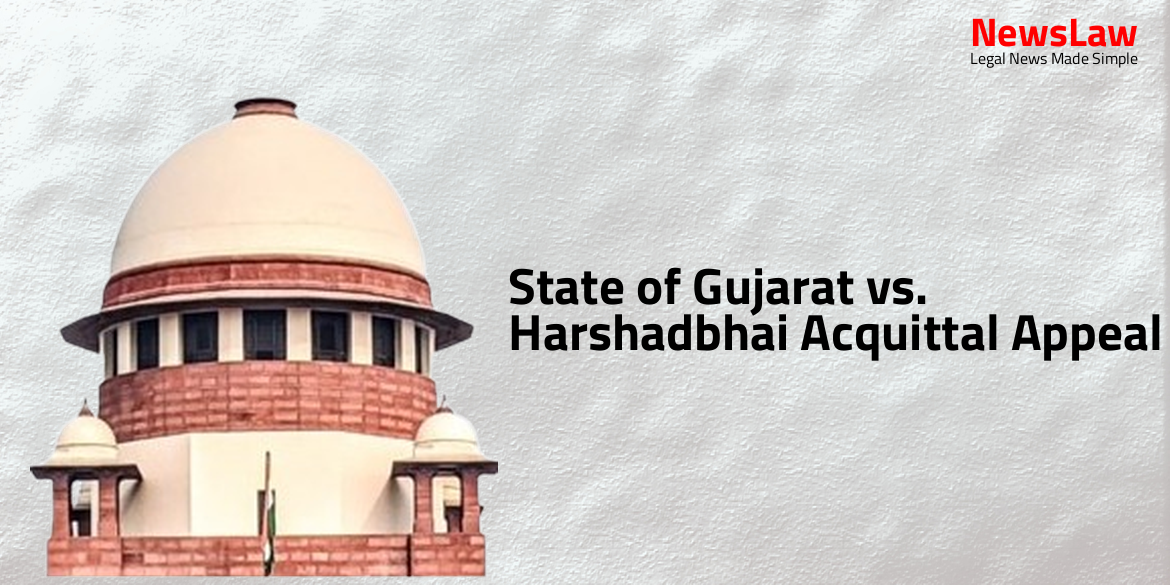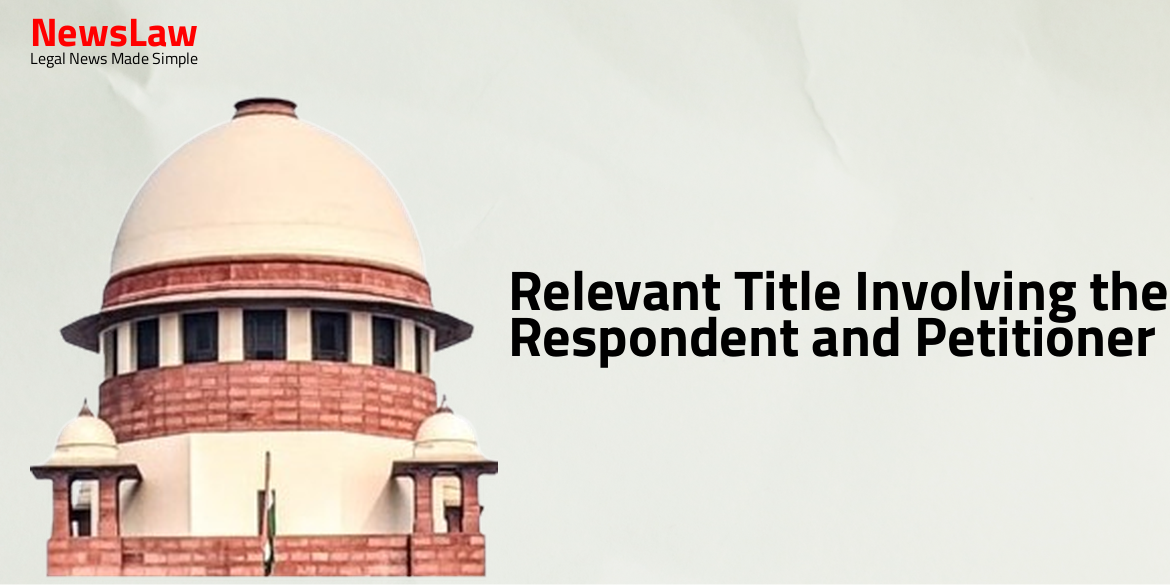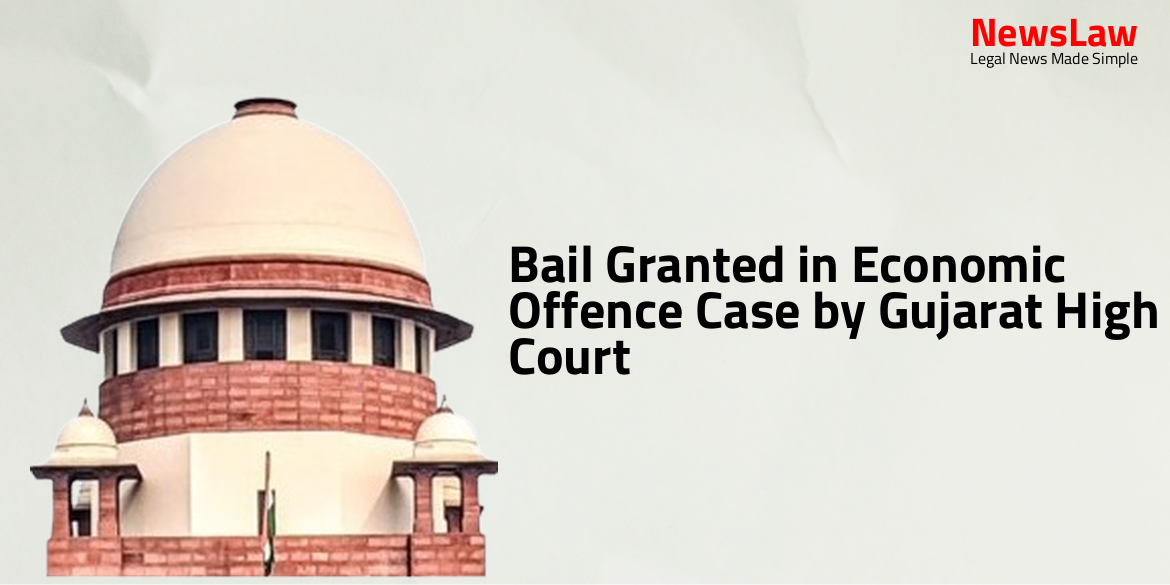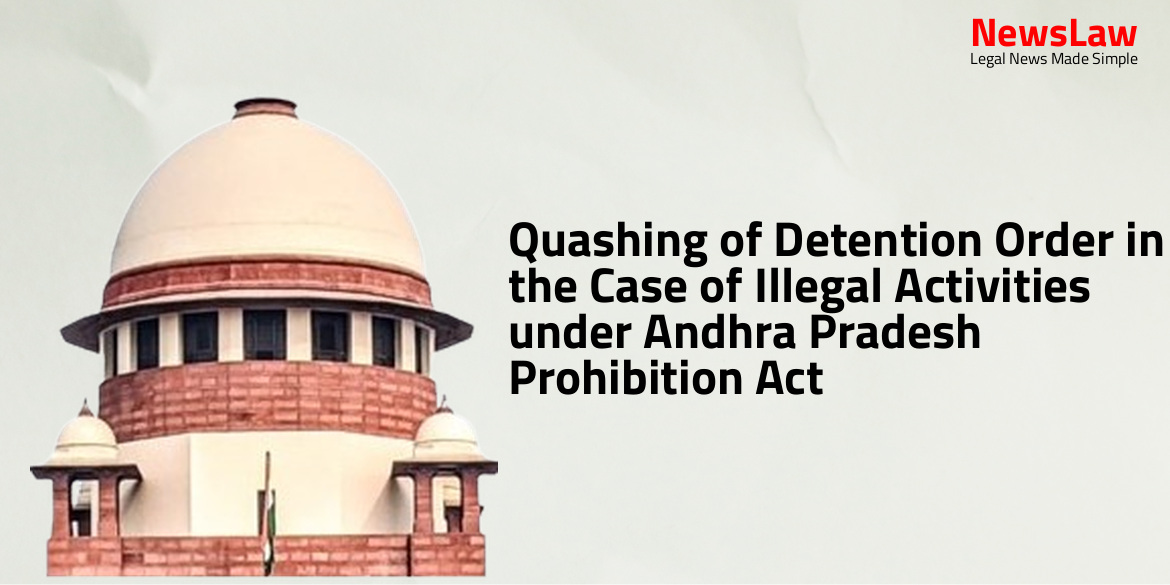In a significant development, the State of Gujarat has filed an appeal against the judgement of acquittal dated 20-04-2009, pertaining to the case involving Harshadbhai. The case revolves around allegations of abetment under section 306, 498 A read with section 114 of IPC. The court’s decision is being revisited, and the High Court’s proceedings will shed light on the details of the acquittal appeal.
Facts
- The appellant, State of Gujarat, has filed an appeal against the judgement of acquittal dated 20-04-2009.
- The accused, Harshadbhai @ Hanso Manibhai Somabhai Khant, was acquitted for the offence under section 306, 498 A read with section 114 of IPC.
- The prosecution’s case highlighted that the daughter of the complainant, Nayanben, was married to the accused 6 years prior to the incident.
- Nayanben was thrown out of the matrimonial house by her husband after being assaulted, following the birth of their daughter.
- The complainant was informed by Nayanben that the husband was demanding money and she was being tortured by all the accused on that ground.
- The accused pleaded not guilty and claimed to be tried when the charges were framed.
- The case was committed to the Sessions Court and numbered as sessions case No.9 of 2009.
- Accused pleaded false implications and prayed to be acquitted.
- The trial court acquitted all accused for the alleged offence.
- The appeal challenging the acquittal is before the Court.
- Prosecution examined 8 witnesses and produced 13 documentary evidences.
- Further statement under section 313 of the Cr.P.C. was recorded.
Arguments
- Learned APP Mr.Dave submitted that prosecution proved the money was demanded and provided by the complainant.
- Trial court acquitted the accused stating the amount was for household expenses of the matrimonial house.
- Mr. Dave argued that the trial court’s acquittal lacked cogent reasons.
- Mr. Dave pointed out that the deceased’s marriage span was less than 7 years, invoking IPC section 113(A) presumption.
- Trial court did not consider the presumption and acquitted the accused.
- Prosecution has proved the unnatural death of the complainant’s daughter.
- Evidence of the medical officer, Dr. Giriraj Lalabhai Chauhan, who conducted the autopsy, supports the cause of death due to asphyxia from hanging.
- Learned APP Mr. Dave argues that minor discrepancies were given undue weightage by the trial court in the acquittal of the accused.
- No major discrepancies in the evidence presented by the prosecution were found during cross-examination.
- The appeal seeks to overturn the acquittal and convict the accused based on the evidence provided.
Analysis
- As per section 113(A) of the Evidence Act, the presumption is not hard and fast and capable of rebuttal.
- The prosecution needs to prove its case beyond reasonable doubt for the presumption under section 113(A) to come into effect.
- The deceased was married to Accused No.1, had a daughter, and was repeatedly sent to collect money from her parents.
- The prosecution witnesses provided testimony about the deceased’s marriage and her interactions with the accused.
- There was no clear evidence of active instigation or abetment of suicide by the accused.
- The prosecution failed to establish a positive act on the part of the accused to instigate or aid in the suicide.
- The investigation revealed that there were no specific incidents of harassment leading to suicide, except for a demand for money for a door installation.
- The witnesses mentioned a lack of harassment for a significant period and a single instance of providing money to the accused.
- The FIR was registered after the deceased committed suicide by hanging and a Janvajog was given by the husband-accused No.1.
- The court acquitted the accused based on the lack of evidence and found no illegality in the judgment.
- The deceased had a previous marriage and divorce before marrying Accused No.1.
- The assurance was given by the accused regarding repayment of money from a fixed deposit.
- Section 113A of the Indian Penal Code pertains to the presumption as to the abetment of suicide by a married woman.
- The court has the discretion to presume a fact under Section 4 of the Indian Evidence Act.
- If a person abets the commission of suicide, they can be punished with imprisonment for up to ten years and may also be fined.
- Abetment of a thing under Section 107 includes instigating someone to do something, engaging in a conspiracy for that thing, or intentionally aiding in the act or omission.
- Appellate Court has full power to review, reappreciate, and reconsider the evidence in an acquittal appeal
- Code of Criminal Procedure does not restrict the Appellate Court from reaching its own conclusion based on the evidence before it
- Phraseologies like ‘substantial and compelling reasons’ are not meant to limit the Appellate Court’s powers in an appeal against acquittal
- Double presumption in favor of the accused in cases of acquittal: presumption of innocence and reinforcement of innocence post-acquittal
- Decision not to interfere with the judgement and order of acquittal in the present case
Case Title: STATE OF GUJARAT Vs. HARSHADBHAI @ HANSO MANIBHAI SOMABHAI KHANT
Case Number: R/CR.A/1525/2009



